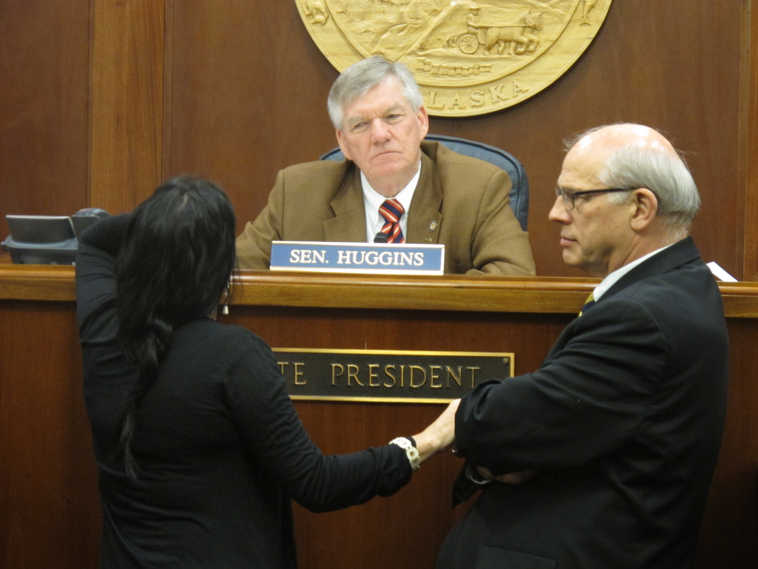JUNEAU — The Alaska Senate passed a broad-ranging education bill Monday, but the issue of how to address public education in the state — and funding, in particular — remained to be resolved in an extended legislative session.
The House and Senate each appointed negotiators for a conference committee on the bill before adjourning Monday evening, guaranteeing at least one more day in Juneau.
Resolution on education was needed to close out the capital budget because additional funding could be attached to the budget. The House, which powered through bills over the last week or so in sessions sometimes lasting late in the day, had two Senate bills on its calendar Monday, including the budget and some concurrence votes. It considered amendments to the budget after gaveling in Monday afternoon.
Sunday was supposed to be the end of the scheduled 90-day session. But education became a sticking point between the House and Senate in the waning days. While voters approved the 90-day limit — and many lawmakers in the past have been loath to violate that in the past — the constitution allows for up to 121 days. Lawmakers decided to just keep plowing ahead. The House and Senate each adjourned after 4 a.m. Monday.
Some lawmakers were antsy to get their work done; Senate Majority Leader John Coghill, R-North Pole, said he hoped to be in Florida by this weekend for his son’s wedding.
The Senate got a late start Monday afternoon, gaveling in about 1 ½ hours later than planned, and, with more than a dozen House bills on its calendar, got right into the education bill. The 16-4 Senate vote was in some ways anticlimactic, since it was known that a conference committee would be appointed to try to work out a deal. The members appointed to the committee were Reps. Mike Hawker, Lynn Gattis and Sam Kito III and Sens. Kevin Meyer, Mike Dunleavy and Lyman Hoffman.
But senators debated the contentious issue of funding, rejecting a proposal by minority Democrats to raise the per-student funding formula, called the base student allocation, by about $650 over three years to help districts avoid cuts and get on a more even keel. The Senate has supported a proposed $100 million in additional school aid outside the formula for each of the next three years. That would be on top of support for other initiatives and programs in the bill, such as charter, residential and correspondence schools.
Sen. Anna Fairclough, R-Eagle River, said the discussion appears to be about money but is really about the best education the state can provide for students. She said the state needs to provide money but in a way that allows teachers to innovate.
Sen. Berta Gardner, D-Anchorage, said it was “extremely short-sighted” for lawmakers to say they don’t like the results they’re seeing in the school system so they’re going to cut money.
Senators also debated providing certain tax credits for contributions to private nonprofit elementary and high schools.
One of the major rubs between the House and Senate was funding. The House, in its rewrite of Gov. Sean Parnell’s education bill, HB278, increased the base student allocation by about $300 over three years, in addition to providing $30 million in one-time aid to be split among districts outside the formula.
The bill also would raise the required local contribution level for schools, speaking to the idea of education funding being a shared responsibility with the state.
It would allow parents to use student allotments through public correspondence programs to buy materials and services from public, private or religious organizations if they are required for a course in a student’s individual learning plan, approved by a district and in line with state standards. That last provision, at one time, was part of a bill that was a companion to a proposed constitutional amendment that would allow for public money to be used for private or religious schools. That proposed amendment stalled this session for lack of support.
The bill also includes provisions to allow students to test out of certain courses they’ve mastered and to repeal the high school exit exam, replacing it with a college or career readiness test. It calls for funding to improve Internet service for schools with lower download speeds and a grant program to encourage “innovative approaches to learning.”
Sen. Kevin Meyer, R-Anchorage, said the Senate bill provides options in education and provides teachers with more resources. He said it was a fair bill and represented reform.
Sen. Johnny Ellis, D-Anchorage, said he was disappointed lawmakers did not use the bill — in what Parnell has proclaimed the “education session” — to address early childhood education.

